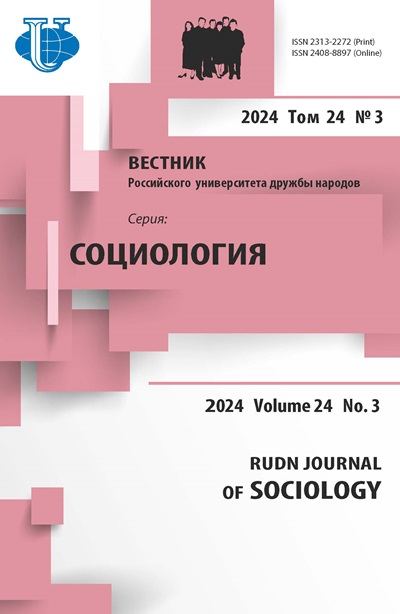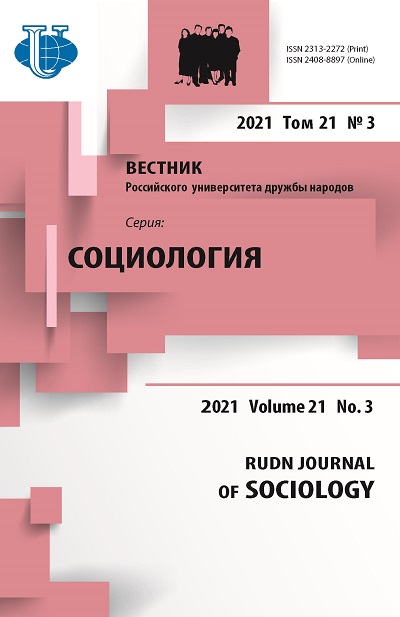Genesis of sociology of media space
- Authors: Sharkov F.I.1,2, Silkin V.V.2
-
Affiliations:
- Moscow State Institute of International Relations (MGIMO University)
- Russian Presidential Academy of National Economy and Public Administration
- Issue: Vol 21, No 3 (2021)
- Pages: 557-566
- Section: Sociological lectures
- URL: https://journals.rudn.ru/sociology/article/view/27420
- DOI: https://doi.org/10.22363/2313-2272-2021-21-3-557-566
Cite item
Full Text
Abstract
Sociology of media space is a new and still developing branch of sociology, just like sociology of space - a basic branch of sociological knowledge. Sociology of space focuses on natural space as a framework for the development of social connections and relations; while sociology of media space considers this space as a part of social space, not as its measurement but as a metaphor. Some natural space turns into a social space only if people use it and live in it. Social boundaries and meanings are added to natural space, which transforms it into a social phenomenon. Although sociology of media space is still developing, there is no doubt that the mass media have made a significant contribution to the development of social relations and sociology by filling social space with messages of all kinds. Media space is a platform that serves as a basis for social communications, a key to the social development, and a means of positive impact on the life of individuals, groups and organizations. Everything social is located in a space-time continuum, and the sociological approach to the theory of network media space is based on the assumption that there is a strong connection between network media communications and social changes. Sociology of media space does not emerge from sociology of space: the developing media space, which is studied with sociological methods, manifests itself in its social coordinates - this is how sociological knowledge expands to consider not only various spatial aspects of social life, but also the features of different contents and information chains created by the convergence of various media and ways of disseminating information.
About the authors
F. I. Sharkov
Moscow State Institute of International Relations (MGIMO University); Russian Presidential Academy of National Economy and Public Administration
Author for correspondence.
Email: sharkov_felix@mail.ru
доктор социологических наук, профессор кафедры социологии Московского государственного института международных отношений (университета) Министерства иностранных дел Российской Федерации; заведующий кафедрой общественных связей и медиаполитики и заместитель декана факультета журналистики Института государственной службы и управления Российской академии народного хозяйства и государственной службы при Президенте Российской Федерации
Prosp. Vernadskogo, 76, Moscow, Russia, 119454; Prosp. Vernadskogo, 84, Moscow, Russia, 119454V. V. Silkin
Russian Presidential Academy of National Economy and Public Administration
Email: vv.silkin@igsu.ru
доктор политических наук, декан факультета журналистики Института государственной службы и управления
Prosp. Vernadskogo, 84, Moscow, Russia, 119454References
- Feik-nyus: masshtab problemy [Fake news: The scale of the problem]. 18.04.2019. URL: https://wciom.ru/index.php?id=236&uid=9660. (In Russ.).
- Buzin V.N. Gumanizatsiya sotsiuma kak imperativ upravleniya mediaprostrastvom [Humanization of society as an imperative of media space management]. Communicology. 2020; 8 (2). (In Russ.).
- Bourdieu P. Sotsiologiya politiki [Political Sociology]. Sost., obshch. red. i predisl. N.A. Shmatko. Moscow; 1993. (In Russ.).
- Bourdieu P. Sotsiologiya sotsialnogo prostranstva [Sociology of Social Space]. Moscow–Saint Petersburg; 2007. (In Russ.).
- Butusov A.V. Sotsialnye seti kak instrument politicheskogo protivoborstva i informatsionnykh voyn [Social networks as a means of political confrontation and information wars]. Vestnik Tambovskogo Universiteta. Seriya: Obshchestvennye Nauki. 2018; 13. (In Russ.).
- Kulikov S.B. Diskretizatsiya sotsialnogo prostranstva i paradigmy v sotsiologii [Discretization of social space and paradigms in sociology]. Sotsiologicheskie Issledovaniya. 2014; 9. (In Russ.).
- Mir 2035. Globalny prognoz [The World of 2035. Global Forecast]. Pod red. A.A. Dynkina. Moscow; 2017. (In Russ.).
- Mogilevskaya G.I. Informatsionnaya voyna v sotsialnykh setyakh [Information war in social networks]. Molodoy Ucheny. 2015; 15. (In Russ.).
- Muzykant V.L., Muzykant P.V. Sotsialnoe izmerenie sovremennogo mediapro-stranstva i ego kontenta [The social dimension of modern media space and its content]. RUDN Journal of Sociology. 2014; 1. (In Russ.).
- Nitsevich V.F. Tsifrovaya sotsiologiya: teoretiko-metodologicheskie istoki i osnovaniya [Digital sociology: Theoretical-methodological origins and foundations]. Tsifrovaya Sotsiologiya. 2018; 1. (In Russ.).
- Sistemny monitoring globalnykh i regionalnykh riskov: Arabsky mir posle Arabskoy vesny [System Monitoring of Global and Regional Risks: The Arab World after the Arab Spring]. Otv. red. A.V. Korotaev, L.M. Isaev, A.R. Shishkina. Moscow; 2013. (In Russ.).
- Tönnies F. Obshchnost i obshchestvo: Osnovnye ponyatiya chistoy sotsiologii [Community and Society: Basic Concepts of Pure Sociology]. Moscow–Saint Petersburg; 2002. (In Russ.).
- Toffler A. Tretiya volna [The Third Wave]. Moscow; 2010. (In Russ.).
- Filippov A.F. Prikladnaya sotsiologiya prostranstva [Applied sociology of space]. Sotsiologicheskoe Obozrenie. 2009; 8 (3). (In Russ.).
- Filippov A.F. Sotsiologiya prostranstva [Sociology of Space]. Saint Petersburg; 2008. (In Russ.).
- Filosofiya i metodologiya nauki (ponyatiya, kategorii, problemy, shkoly, napravleniya) [Philosophy and Methodology of Science (Concepts, Categories, Issues, Schools, Directions). Terminologichesky slovar-spravochnik. Moscow; 2017. (In Russ.).
- Sharkov F.I. Kommunikologiya [Communicology]. Entsiklopedichesky slovar-spravochnik. Moscow; 2009. (In Russ.).
- Sharkov F.I. Chetvertaya volna (interaktivnye elektronnye kommunikatsii) [The Fourth Wave (Interactive Digital Communications)]. Moscow; 2005. (In Russ.).
- Yudina E.N. Mediaprostranstvo kak kulturnaya i sotsialnaya sistema [Media Space as a Cultural and Social System]. Moscow; 2005. (In Russ.).
- Barnes J.A. Class and committees in a Norwegian Island Parish. Human Relations. 1954; 7.
- Bustillos J. The Digital Divide. Neoliberal Imperatives and Education. S. Isaacs (Ed.). London–New York; 2017.
- Ciacu Grasu N. The impact of new media on society. URL: https://www.researchgate.net/ publication/215489586_The_impact_of_new_media_on_society.
- Hakim Khalid Mehraj, Akhtar Neyaz Bhat, Hakeem Rameez Mehra. Impacts of media on society: A sociological perspective. International Journal of Humanities and Social Science Invention. 2014; 3 (6).
- Herbert J.G. The Sociology of Space: A Use-Centered View. New York; 2002.
- Fearon D. Georg Simmel. The Sociology of Space. URL: https://escholarship.org/uc/item/ 7s73860q.
- Kravchenko S.A. Sociology on the move: The demand for the humanistic digital turn. RUDN Journal of Sociology. 2019; 19 (3).
- Lefebvre H. The Production of Space. Oxford; 1991.
- Marres N. Digital Sociology. The Reinvention of Social Research. Cambridge; 2017.
- Mosco V. Becoming Digital. Toward a Post-Internet Society. Bingley; 2017.
- Vanderberg W.H. Our Batter for the Human Spirit: Scientific Knowing, Technical Doing, and Daily Living. Toronto; 2016.














